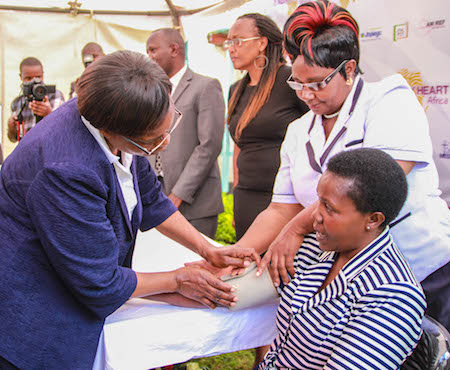Silent Killer Gaining Momentum in Africa: Partnership designed to address hypertension, cardiovascular disease head-on
Right now, we have the opportunity to confront a silent killer that is gaining momentum across Africa. Hypertension, or raised blood pressure, has grown quietly but dangerously across the continent and now affects a greater proportion of adults in Africa than in any other region.
Hypertension is a major risk factor for stroke, heart attack, heart failure and kidney disease – all components of cardiovascular disease (CVD), which is now the second leading overall cause of death in Africa after infectious diseases. By 2020, the total burden of CVD in Africa is expected to have doubled from 1990. Addressing one of the main risk factors for this disease requires an immediate and coordinated effort by ministries of health, health care professionals, the private sector and funders to build and sustain effective cardiovascular care in communities across Africa.
Hypertension looms largely out of sight from the people whom it affects most. Few symptoms are visible before more serious conditions develop. While nearly one-third of African adults have hypertension, a recent study revealed that more than 90 percent of hypertensive adults in some countries were not aware of their condition. As a result, patients often present with late stage CVD despite hypertension being highly treatable.
When they do present, we are missing opportunities to implement relatively simple, proven practices to diagnose and treat the condition. Many health facilities and health care professionals – particularly at the primary care level – lack the equipment, simplified protocols and medicines needed to screen for and treat hypertension. This leads to very poor treatment and control rates.
 I have experienced these challenges firsthand as a practicing cardiologist in Kenya. As practicing clinicians we increasingly see the tragic consequences of untreated hypertension: debilitating stroke in a young person; terminal heart failure; heart attacks; and chronic kidney disease requiring dialysis or transplant. The socioeconomic burden to families and society is enormous. Yet the treatment of hypertension is simple and inexpensive. Primary prevention by adequate treatment of hypertension is therefore a socioeconomic, even moral imperative.
I have experienced these challenges firsthand as a practicing cardiologist in Kenya. As practicing clinicians we increasingly see the tragic consequences of untreated hypertension: debilitating stroke in a young person; terminal heart failure; heart attacks; and chronic kidney disease requiring dialysis or transplant. The socioeconomic burden to families and society is enormous. Yet the treatment of hypertension is simple and inexpensive. Primary prevention by adequate treatment of hypertension is therefore a socioeconomic, even moral imperative.
(A blood pressure check at last year’s launch of Healthy Heart Africa, left.)
My experience in Kenya is representative of the challenges we face in treating hypertension across Africa. However, there are new efforts that promise to address these barriers head on. Healthy Heart Africa, a public-private partnership launched by AstraZeneca in 2014, is working to tackle hypertension and the burden of cardiovascular disease across the continent. Healthy Heart Africa seeks to improve hypertension care through three pillars:
Education and awareness: Conducting campaign and awareness-raising activities that will encourage people to seek screening and diagnosis when needed.
Training and guidelines: Building health care workers’ capacity to provide comprehensive and appropriate hypertension care, based on guidelines developed in collaboration with professional societies and the Kenyan Ministry of Health.
Access and affordability: Strengthening the supply chain for antihypertensive medicines and ensuring patients can access affordable, high-quality care.
Healthy Heart Africa is currently implementing demonstration projects in Kenya working closely with seven partners – AMPATH, AMREF Kenya, the Christian Health Association of Kenya, Jhpiego, Population Services Kenya, Mission for Essential Drugs and Supplies and Abt Associates. Through 2016, Healthy Heart Africa will build on lessons learned from these demonstration projects and scale up best practices across Kenya. By 2025, Healthy Heart Africa aims to empower patients to control their hypertension throughout the continent.
While Healthy Heart Africa demonstrates the potential power of public-private partnerships to combat the rising tide of hypertension and noncommunicable diseases in Africa, significant work and investment are still needed. Individuals and organisations from across government, private, community-based, multilateral sectors and more must come together right now to set Africa on course for a healthier future.
Dr. Elijah Ogola is vice president, East-Pan-African Society of Cardiology, and a technical adviser to the Healthy Heart Africa initiative.
- Categories
- Health Care
